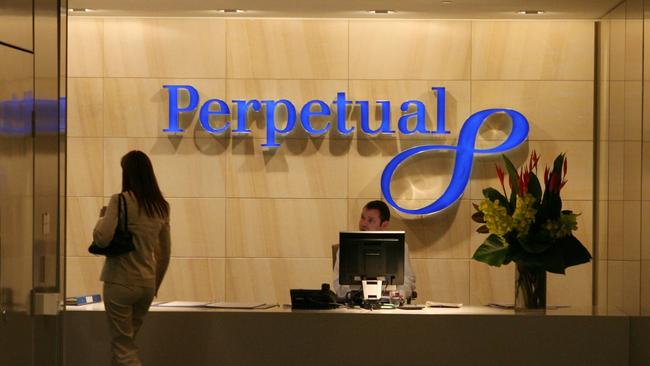Perpetual likely to sweeten Pendal takeover offer as analysts caution on cultural risks
Perpetual has scope to lift its $2.4bn bid for funds management peer Pendal, but cultural differences and deal execution pose risks.

Perpetual could lift its $2.4bn bid for funds management peer Pendal and still reap benefits from the deal, but cultural differences and transaction execution pose risks, investors and analysts say.
Perpetual’s scrip and cash bid became public on Monday after it was lobbed with Pendal’s board late on Friday. Pendal executives and investor relations employees were engaging with key investors on Monday evening to gauge views on the Perpetual offer and field any questions.
Given the large scrip component of the transaction, the initial $2.4bn deal value will fluctuate and it will take time for Pendal and its advisers to assess the proposal.
Under deal terms, Pendal’s shareholders would own 48 per cent of the merged business and the transaction would create a funds behemoth with more than $200bn under management.
The non-binding bid was pitched at one Perpetual share for every 7.5 Pendal shares plus $1.67 cash. The offer reflected a premium 39.2 per cent to Pendal’s closing share price on Friday, but just a 0.3 per cent premium to the stock’s volume-weighted average price for the 180 days prior to April 1. Pendal – which is run by Nick Good – saw its shares rise 1.5 per cent on Tuesday to $5.37, after an 18.1 per cent surge the prior day. Shares in the Rob Adams-run Perpetual increased 1.3 per cent to $32.38, following a 6.6 per cent slump on Monday.
Washington H Soul Pattinson and Company – which holds stock in Pendal and Perpetual – has raised questions about the large scrip component of the proposed takeover and also signalled the bid amount may need to rise.
WHSP’s chief investment officer Brendan O’Dea labelled the Perpetual bid “opportunistic”, which was to be expected given the suitor was capitalising on the recent sell off in asset management firms. “It is strategically rational with consolidation in the sector logical in the face of persistent margin compression and the need to have global multi-asset scale to compete,” he said.
“Pendal has a solid suite of global products that would be very attractive to Perpetual, Perpetual has two strong additional businesses in Private and Trust to diversify earnings risk.
“We can see the combination working well on paper but asset management businesses are run by people and there may well be cultural challenges. The Perpetual team may need to sweeten the deal but the scrip heavy deal structure may be a constraint.”

Pengana chief executive Russel Pillemer, a former investment banker, cautioned on the potential for issues if fund management firms merged investment teams to seek out cost savings.
“The rationale is synergies between the two groups. In my view, some synergies are illusory,” he said, speaking broadly on the funds sector.
Mr Pillemer noted that often when funds management firms merged investment teams the result was a loss of clients.
Pengana does not own shares in Pendal or Perpetual.
Analysts at UBS led by Shreyas Patel said they saw scope for Perpetual to raise its offer before earnings-per-share benefits were eroded.
“With the offer valuing Pendal at circa 12.8 times, below its long-term average of 14.1 times we think the Pendal board is unlikely to accept the current offer, but we see room for the offer price to move higher,” they added. “On our analysis, the deal becomes EPS neutral at a scrip ratio to one Perpetual (share): 6.5 Pendal (shares) implying $7 per share. Alternatively, for the given scrip ratio, the Perpetual share price would need to fall below $24.
“While a combined Perpetual/Pendal could help fill strategic gaps offshore it would also diversify Perpetual away from its higher PE non asset management businesses, and is not without staff retention and cultural risks.”
The UBS analysts estimate the proposed deal would be 7 per cent EPS accretive for Perpetual including the flagged $50m pre-tax cost synergies the fund manager estimates it can extract from the transaction.
Consolidation in funds management has been a theme globally and locally in the past 12 months. Last month, VGI Partners and larger rival Regal Funds Management sealed a transaction that created a combined firm called Regal Partners.
Perpetual’s funding plans for the Pendal tilt are also being closely watched.
Citi analyst Nigel Pittaway estimated Perpetual may raise $500m in equity to help fund the transaction if it were to gain traction. He listed a number of positives that would result from the marriage of the fund management firms including increased scale and environmental, social and governance capabilities, cost efficiencies and helping Perpetual leverage its investment in building out product distribution.
Mr Pittaway said challenges for the mooted deal included difficulties in extracting acquisition benefits, potential cultural issues and the potential for revenue to shrink in some areas if the transaction is not executed well.
Bell Potter analyst Marcus Barnard thinks Perpetual may increase the cash component of its offer, as it would be reluctant to hand Pendal much more than 48 per cent of the combined group
“Adding 30c of cash to the offer, on 382m shares would cost around $115m. This may be a price that Perpetual should consider as it may tip the balance and could make this a knockout proposal, that Pendal shareholders can’t refuse,” he said. “Perpetual can’t really increase the share part of the offer without making Pendal more than 50 per cent of the combined group.”






To join the conversation, please log in. Don't have an account? Register
Join the conversation, you are commenting as Logout